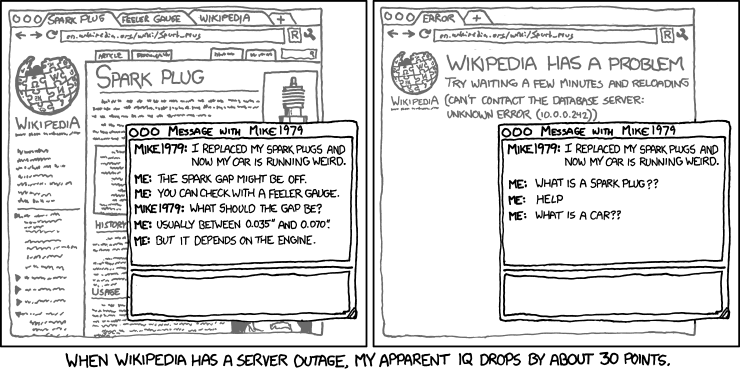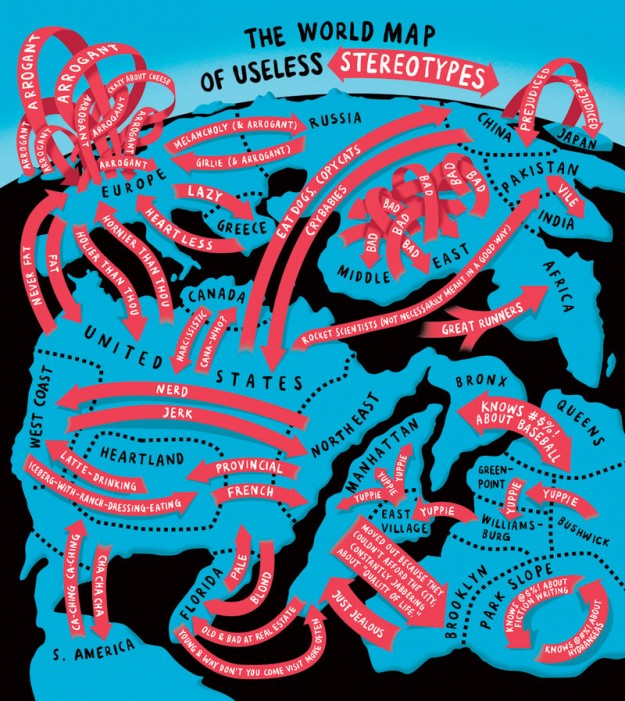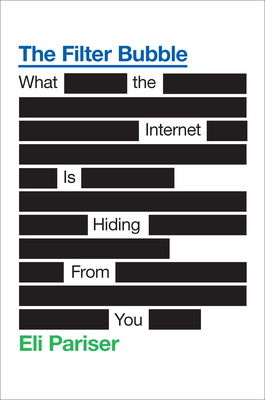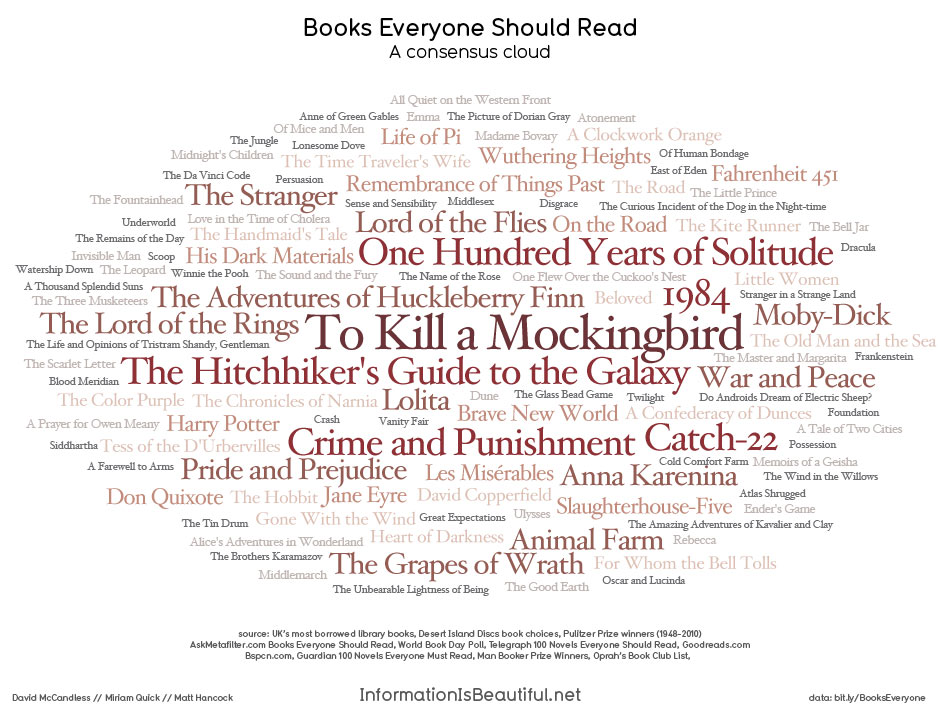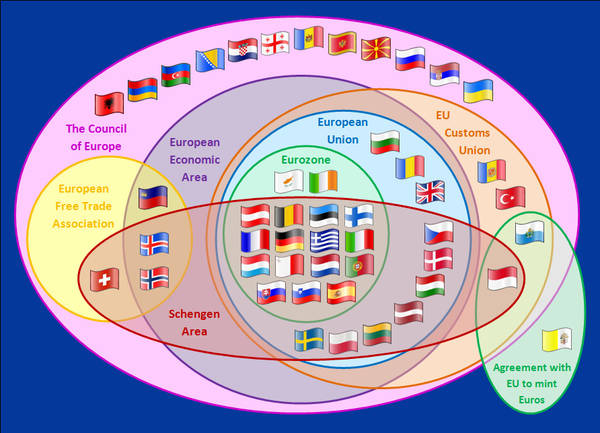The wonders of Wikipedia never cease to amaze me. Only today do I discover these print and pdf options
that will turn an article that looks like this:
into a nice printable pdf like this:
Friday, December 9, 2011
Friday, December 2, 2011
Wednesday, November 30, 2011
Universities under attack
Fritt Ord, the London Review, and the New York Review of Books jointly sponsored a conference last week about the current plight of universities, "Universities Under Attack." You can read Keith Thomas's remarks from the conference at the LRB website. See also Our Universities: Why are they Failing?, Anthony Grafton's review 8 recent books on this topic in the New York Review of Books.
Sunday, November 13, 2011
Future of libraries stuff
The future library could be a "fab-lab" - like the one taking shape at the Fayettville Free Library - or it could be something else, depending on the findings of a newly inaugurated Pew study on the Changing Role of Public Libraries and Library Users in the Digital Age .
Saturday, November 12, 2011
LIbrarians as "open source officers"
This NPR story suggests that the Onion was not too far off on its take on CIA's fbook program. And note that there are great opportunities here for social media savvy librarians!
Friday, October 21, 2011
A two bit player
Here's my Twitter character...not real impressive, doesn't even have shoes. Generate your own Twitter infographic at visual.ly
Tuesday, October 18, 2011
Thursday, October 13, 2011
What get's digitized?
An editorial in the NYT on the "curious contents of the digital library" alerted me to manybooks.net where all sorts of treasures are to be found, and to the amazing app from the British Library, the British Library 19th Century Collection. How extraordinary to be able to read something like Disraeli's Curiosities of Literature on one's iPad or Kindle!
Wednesday, October 5, 2011
Saturday, October 1, 2011
Thursday, September 29, 2011
Tuesday, September 13, 2011
Old Russia in Color
See extraordinary color photographs by Sergei Mikhailovich Prokudin-Gorsky at the fascinating "A Journey Through Slavic Culture" blog. The owner of the blog (whose identity is not readily apparent)writes:
"For those who don’t know yet, Sergei Mikhailovich Prokudin-Gorsky was a photographer who’s experience in chemistry created one of the earliest techniques of color photography, which he used to document the scope of the Russian empire prior to the revolution, giving us a glimpse into the lives and cultures of the time."
"For those who don’t know yet, Sergei Mikhailovich Prokudin-Gorsky was a photographer who’s experience in chemistry created one of the earliest techniques of color photography, which he used to document the scope of the Russian empire prior to the revolution, giving us a glimpse into the lives and cultures of the time."
Friday, August 19, 2011
Sunday, July 24, 2011
Friday, July 22, 2011
Good old days
Some day, public libraries will be regarded with that far greater reverence we reserve for things we once had. Alan Bennett gets us off to a wonderful start , and has a nice parting shot:
It’s hard not to think that like other Tory policies privatising the libraries has been lying dormant for 15 years, just waiting for a convenient crisis to smuggle it through. Libraries are, after all, as another think tank clown opined a few weeks ago, ‘a valuable retail outlet’.
It’s hard not to think that like other Tory policies privatising the libraries has been lying dormant for 15 years, just waiting for a convenient crisis to smuggle it through. Libraries are, after all, as another think tank clown opined a few weeks ago, ‘a valuable retail outlet’.
Sunday, July 17, 2011
Books as fetish objects
Sad times for bibliophiles; the book, writes James Gleick, "is like the coffin at a funeral. It deserves to be honored, but the soul has moved on."
Friday, July 15, 2011
Death of the expert, or birth of the expert?
Sven Birkerts has a bone to pick with Maria Bustillos' article Wikipedia and the Death of the Expert. Sven has been windmill-tilting indefatigably ever since the Gutenberg Elegies (1994!), and you can't help admire the poor sod - not only for his pluck, but also for his beautiful and perceptive writing. And for providing such inspiring examples of what both he and I cherish; non-instrumental thinking and writing. Bustillos responds here, but methinks "Wikipedia and the birth of the expert" would have been a better title for her article....
Introducing the Mechanic Muse
(excerpt) In this week’s issue, the Book Review inaugurates a new column, The Mechanic Muse, that will examine different aspects of this techno-literary complex. This week, Kathryn Schulz takes a virtual trip to the Stanford Literary Lab, where literary scholars are mutating into computer scientists, and vice versa. Can a computer recognize a literary genre or help us see the plot of “Hamlet” anew? Should it? Read the column to decide for yourself.
Wednesday, July 13, 2011
Friday, July 1, 2011
Tuesday, June 28, 2011
Wednesday, June 22, 2011
Thursday, June 16, 2011
Monday, June 6, 2011
20 facts about US inequality
20 Facts About US Inequality That Everyone Should Know (With An Update On The Uber-Wealthy And Global Wealth Inequality)
From zerohedge.com, infographics from many different sources about many different kinds of inequality in the US - for example,
From zerohedge.com, infographics from many different sources about many different kinds of inequality in the US - for example,
Thursday, May 19, 2011
Wednesday, May 18, 2011
The Stockholm Syndrome Theory of Long Novels
A long but captivating article by Mark OConnnell about the "no pain no gain" reading experience.
Friday, May 13, 2011
Narrowing your horizons
The internet's potential for personalizing your information and network of contacts, or, to put it another way, narrowing your horizons, is vast. Surfers will do this well enough on their own by simply following their preferences, but when technology aids and abets by filtering information on the basis of your browsing history...that way lies trouble, according to Eli Pariser's The Filter Bubble
Tuesday, May 3, 2011
Sunday, May 1, 2011
Libraries have nothing at all to do with silence
Nice piece by Bella Bathurst in the Guaradian on the "Secret life of libraries"
excerpts:
"In London during the Second World War, some authorities established small collections of books in air-raid shelters. The unused Tube station at Bethnal Green had a library of 4,000 volumes and a nightly clientele of 6,000 people."
"The libraries' most powerful asset is the conversation they provide – between books and readers, between children and parents, between individuals and the collective world. Take them away and those voices turn inwards or vanish. Turns out that libraries have nothing at all to do with silence."
excerpts:
"In London during the Second World War, some authorities established small collections of books in air-raid shelters. The unused Tube station at Bethnal Green had a library of 4,000 volumes and a nightly clientele of 6,000 people."
"The libraries' most powerful asset is the conversation they provide – between books and readers, between children and parents, between individuals and the collective world. Take them away and those voices turn inwards or vanish. Turns out that libraries have nothing at all to do with silence."
Saturday, April 30, 2011
This is fun
For all who find that coming up with new passwords brings mental functions to an immediate halt and is uncannily, perversely difficult (kind of like remembering jokes), this article about multi-word passwords is a relief.
Wednesday, April 27, 2011
Quaint libraries
CNET editor Brian Cooley has rattled librarians' cages with some ill considered words about the "quaintness" of libraries, aired during a segment about Kindle's new library services on the April 20, 2011 "Buzz Out Loud" podcast. He clarifies his position here. But is quaintness such a bad thing?
Friday, April 15, 2011
Nice poem by a Fulbrighter
In a field
I am the absence
of field.
This is
always the case.
Wherever I am
I am what is missing.
When I walk
I part the air
and always
the air moves in
to fill the spaces
where my body’s been.
We all have reasons
for moving.
I move
to keep things whole.
Thursday, April 7, 2011
Get real!
So I'm an old fogey, but to me the old 1960s exhortation, "Get real!" sounds so much better than the 2011 one, "Cartoonify yourself!"
Wednesday, April 6, 2011
Fast food
A very useful service from Google labs for identifying and addressing page speed issues.....fortunately, never much of a line in front of Knowbodies.
Tuesday, April 5, 2011
The Noun Project
The noun project has symbols for everything, including tango
"The Noun Project collects, organizes and adds to the highly recognizable symbols that form the world's visual language, so we may share them in a fun and meaningful way. "
"The Noun Project collects, organizes and adds to the highly recognizable symbols that form the world's visual language, so we may share them in a fun and meaningful way. "
Friday, April 1, 2011
Google forges ahead....
Google has been working with experts in semiotics and kinesiology to develop Gmail Motion. Pretty amazing!
Wednesday, March 30, 2011
Tuesday, March 29, 2011
Friday, March 25, 2011
Arab spring: interactive timeline of Middle East protests
Very cool interactive graphic from the Guardian. It doesn't show where the "path of protest" is leading, but perhaps time will tell.
Thursday, March 24, 2011
A digital library better than Google's
Harvard library director Robert Darnton applauds rejection of Google settlement earlier this week and calls for a public digital library.
In a nutshell:
This decision is a victory for the public good, preventing one company from monopolizing access to our common cultural heritage. Nonetheless, we should not abandon Google’s dream of making all the books in the world available to everyone. Instead, we should build a digital public library, which would provide these digital copies free of charge to readers.
In a nutshell:
This decision is a victory for the public good, preventing one company from monopolizing access to our common cultural heritage. Nonetheless, we should not abandon Google’s dream of making all the books in the world available to everyone. Instead, we should build a digital public library, which would provide these digital copies free of charge to readers.
Saturday, March 19, 2011
Ski champ Petter Northug plays one of my favorites, Paderewski's Nocturne. Beautiful!
PETTER NORTHUG PLAYS PADEREWSKI'S NOCTURNE
Monday, March 14, 2011
Freeman Dyson on Science and Wikipedia
In the NYRB, Freeman Dyson says Wikipedia is totally unreliable, and surprisingly accurate. And science is more like Wikipedia than Encyclopedia Britannica.
Science is the sum total of a great multitude of mysteries. It is an unending argument between a great multitude of voices. It resembles Wikipedia much more than it resembles the Encyclopaedia Britannica.
Science is the sum total of a great multitude of mysteries. It is an unending argument between a great multitude of voices. It resembles Wikipedia much more than it resembles the Encyclopaedia Britannica.
Saturday, March 12, 2011
Bad reviews III
I've previousl confessed with shame, that I can delight in a a good, bad review. Emily St. John Mandel Post writes less despicably On Bad Reviews at the Millions (also has an interesting comment thread)
Wednesday, February 16, 2011
Reader's block
Wonderful essay by Geoff Dyer on reader's block. Didn't get through all of it, will finish later.
Friday, February 11, 2011
Thursday, February 10, 2011
Keen strikes again
Andrew Keen, author of the much ridiculed and reviled - in blogger circles - "The Cult of the Amateur" (I thought it was good, though) will publish Digital Vertigo: An Anti-Social Manifesto in 2012. For a preview, see his essay Your Life Torn Open in this month's Wired(UK). I think he's mostly right...but what's the point.
Tuesday, February 8, 2011
Sunday, February 6, 2011
Better World Flux
Another impressive data visualization tool (see also this 2009 post for a review of some others):
Better World Flux was created as an entry for the World Bank Apps for Development competition. The site aims to raise awareness for the UN Millennium Development Goals by letting users visualize and share stories that are hidden in the World Bank Open Data.
Better World Flux is a tool that could be used to:
- build an ideal composite of what you think matters in life by selecting the indicators
- track the progress of countries and the world over the years and find interesting trends and patterns
- save and share your most compelling visualization and discover what others are sharing and have a conversation
- see which countries need the most help and find the ideal country to live in based on your preferences
- see which countries need the most help
- find the ideal country to live in based on your preferences
- explore and easily navigate the raw data for each country
Saturday, February 5, 2011
Tuesday, February 1, 2011
What's worth saving
 Here's a nice passage from Ingrid Rowland's post Saving Alexandria about Egyptians surrounding the Alexandrine library to protect it against vandalism:
Here's a nice passage from Ingrid Rowland's post Saving Alexandria about Egyptians surrounding the Alexandrine library to protect it against vandalism: Blind rage cannot understand anything as complex or beautiful as Rome, or a library, or even a person, an animal, a book, a tree, a work of art—but blind rage can make these intricate systems stop, and the ability to make things stop has served many of our kind since time immemorial as a fine substitute for learning, experience, scientific method, artistic creation, philosophy.
Monday, January 31, 2011
Nazis, and then DDR commies, commandeer Jewish condom empire
This is an interesting book review in the Berlin Review of Books, and an opportunity for a blog post title that will appeal to search engines.
Fromms: Wie der jüdische Kondomfabrikant Julius F. unter die deutschen Räuber fiel The Great Rubber Robbery: How Julius Fromm’s Condom Empire Fell to the Nazis
Fromms: Wie der jüdische Kondomfabrikant Julius F. unter die deutschen Räuber fiel The Great Rubber Robbery: How Julius Fromm’s Condom Empire Fell to the Nazis
Friday, January 28, 2011
Reading list on technology criticism
Critical perspectives on science and technology - a reading list.
Thursday, January 27, 2011
A cautionary tale for overeager weeders
A rousing defense of libraries by Philip Pullman led me (via the comments) to this post at I love Franklin Ave. blog
It may well be apocryphal, but it's a charming tale that makes a point nonetheless.
It may well be apocryphal, but it's a charming tale that makes a point nonetheless.
Wednesday, January 26, 2011
Library City
Toward a universal national digital library system with public governance - blog with lots of interesting stuff! The introductory post explains what it's all about.
Thursday, January 20, 2011
Vive la différence
A glossary by Schott (he of Schott's Miscellany) of "arcane national caricatures from writers curiously fascinated with difference."
Friday, January 14, 2011
Great "books on wheels" accessory
Nothing warms the heart of a librarian like an invention - however primitive - that encourages people to read more. Can also be used for writing - and notice that it does not interfere with the action of the steering wheel. Ingenious!
Thursday, January 6, 2011
Tuesday, January 4, 2011
Monday, January 3, 2011
Philip Zimbardo on how perspectives of time affect work, health, relationships and well-being.
10 well-spent minutes: Philip Zimbardo on how perspectives of time affect work, health, relationships and well-being.
2011 book preview
From The Millions, a month by month preview of books in the year to come. I look forward to David Bezmozgis's first novel.
Subscribe to:
Posts (Atom)














